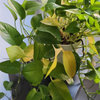testing kits
sue_ct
9 years ago
Related Stories

Kit Houses Stand the Test of Time
See how these mass-produced catalog houses have made their way into the modern day
Full Story
COFFEE WITH AN ARCHITECTAn Architect's Tool Kit
These 13 tools of the trade help architects make the magic happen
Full Story
OUTBUILDINGSStudio Solution: A Kit Greenhouse Becomes a Creative Private Office
See how an inventive work-from-home designer made an office from a greenhouse, for some inspired thinking in the backyard
Full Story
DECORATING PROJECTSDIY: Create a Custom-Stamped Curtain
With simple fabric and a stamp carving kit, you can make your own pattern to apply to curtains and other textiles
Full Story
MONTHLY HOME CHECKLISTSDecember Checklist for a Smooth-Running Home
It's time to add weather stripping, plan for holiday home safety, consider backup heating, check your emergency kits and more
Full Story
HEALTHY HOMEWhat's the Deal With Radon?
Get the facts on testing for this cancer-causing gas — and how to make your home safe if it shows up
Full Story
HEALTHY HOMEGet the Lead Out: Lead Safety at Home
Keep your family safe by properly testing for and dealing with lead in old painted surfaces, water and soil
Full Story
GARDENING AND LANDSCAPINGContractor Tips: Build a Top-Notch Deck
Get an outdoor deck that fits your lifestyle and stands the test of time by keeping these 4 considerations in mind
Full Story
GREAT HOME PROJECTSReady to Repaint Your Home’s Exterior? Get Project Details Here
Boost curb appeal and prevent underlying damage by patching and repainting your home’s outer layer
Full Story
GREAT HOME PROJECTSWhat to Know About Adding a Reclaimed-Wood Wall
Here’s advice on where to put it, how to find and select wood, what it might cost and how to get it done
Full StoryMore Discussions







ajames54
waterbug_guy
Related Professionals
New Bedford Landscape Architects & Landscape Designers · Marina Landscape Architects & Landscape Designers · Wheeling Landscape Architects & Landscape Designers · Peabody Landscape Contractors · Alamo Landscape Contractors · Athens Landscape Contractors · Azalea Park Landscape Contractors · Barrington Landscape Contractors · Elmhurst Landscape Contractors · Fair Oaks Landscape Contractors · Fort Payne Landscape Contractors · Hickory Hills Landscape Contractors · Hilo Landscape Contractors · Pine Hills Landscape Contractors · Round Lake Landscape Contractorssue_ctOriginal Author
ajames54
sue_ctOriginal Author
ajames54
sue_ctOriginal Author
waterbug_guy
sue_ctOriginal Author